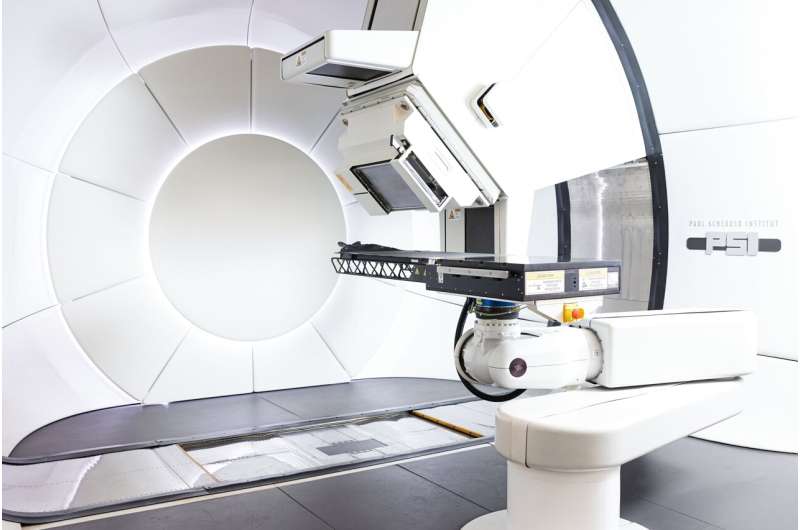This article has been reviewed according to Science X's editorial process and policies. Editors have highlighted the following attributes while ensuring the content's credibility:
fact-checked
trusted source
proofread
Proton radiotherapy treats esophageal cancer for first time in Switzerland

A 67-year old patient presenting with esophageal cancer has been treated at the Paul Scherrer Institute PSI with a form of radiation provided by protons, i.e., positively charged particles. This is the first time this type of radiotherapy has been used in Switzerland to treat an esophageal tumor.
The five-week course of treatment is part of a European clinical trial involving both PSI and University Hospital Zurich. Medical researchers are investigating whether proton therapy is suitable for treating this type of cancer, as it could potentially reduce lung complications that typically occur with traditional radiotherapy.
"Today we have used proton radiotherapy to treat a patient with esophageal cancer for the first time, within the framework of a collaborative European Phase III clinical trial," confirms Damien Weber, senior clinician and Head of the Center for Proton Therapy (CPT) at PSI. "The 67-year-old patient has a Siewert type II tumor at the esophagogastric junction, which will be resected after our treatment."
Since 1996, PSI has been successfully treating patients with tumors in the head and neck area, as well as along the spine, but this technique has never been used before in Switzerland to treat esophageal cancer. "We are delighted to now be able to offer this type of treatment to patients in Switzerland as part of a clinical trial," says Matthias Guckenberger, Medical Director and Head of the Department of Radiation Oncology at University Hospital Zurich (USZ).
USZ and PSI are building on their long-standing collaboration in cancer treatment to investigate whether protons offer advantages for radiotherapy of the esophagus. This research is part of the pan-European PROTECT trial (PROton versus photon Therapy for Esophageal Cancer: a Trimodality Strategy), which compares the side-effects of conventional radiotherapy with proton therapy to treat esophageal cancer.
Rare type of cancer requires complex treatment
Every year around 600 people in Switzerland, three quarters of them men, are diagnosed with cancer of the esophagus. Although this makes it a relatively rare form of cancer, it is still the eighth most common cancer worldwide.
In most cases the treatment involves a combination of chemotherapy and radiation, followed by surgery to remove any tumor residue and the surrounding lymph nodes. Since the excision of the tumor also requires the removal of a part of the esophagus, the remaining healthy parts are subsequently connected with the stomach.
Radiotherapy for esophageal cancer can unfortunately lead to varying degrees of complications in the surrounding organs, especially the lungs. This sensitive organ sits right next to the esophagus within the chest cavity and is often negatively affected by radiation directed at the tumor. Many patients, for example, subsequently develop pneumonia or other problems, which can complicate vital surgery or post-op recovery.
Proton therapy could offer a solution. "Our hope is that proton radiotherapy should cause far fewer lung complications," says Damien Weber. "We now want to verify whether our prediction is correct—for the good of all cancer patients.
Both protons and photons (used in traditional radiotherapy) can damage the DNA in tumor cells, killing them off. Although X-rays can be targeted at tumors with great precision nowadays, they also tend to affect the surrounding healthy tissue and may cause damage.
Unlike photons, protons are electrically charged particles. Their depth of penetration into the tissue is precisely calibrated beforehand. Protons lose very little of their energy as they make their way to the site of the tumor, where they release their main effect. Potential damage to healthy tissue surrounding the tumor is therefore largely avoided. Medics hope this approach will lead to fewer lung complications after a course of radiotherapy.
Pan-European study
Nineteen research partners across Europe—including universities, hospitals and research centers—are joining forces in the collaborative PROTECT trial. "Because we work so closely together, we hope to be able to recruit several hundred participants, so the results of the study will carry far more weight," says radiation oncologist Dominic Leiser, Head of Clinical Studies at PSI. Aarhus University in Denmark is the main project coordinator. PSI was one of the study initiators at European level.
The project involves treating a total of almost 400 patients with non-metastatic esophageal cancer, about 20 of them based in Switzerland. All study participants first undergo a course of combined radiotherapy and chemotherapy, followed by surgery to remove the tumor six to 12 weeks later.
Around half of them will receive conventional photon X-rays at USZ, while the rest will be treated with protons at PSI. PROTECT is designed as a randomized trial in order to provide a direct comparison of the outcome of both types of treatment. At USZ all participants will not only receive conventional radiotherapy, but also chemotherapy followed by surgery to remove any tumor residue.
"We are using all three modes of cancer therapy to ensure the best possible treatment outcome for this type of cancer," explains Panagiotis Balermpas, principal investigator and Senior Physician at the Department for Radiation Oncology at USZ. "And irrespective of whether patients are given radiotherapy in the form of photons or protons, they will receive the very best treatment over the course of the study."
The PROTECT trial is always looking for new patients and screening their eligibility for participation in the study. The trial also includes patients with tumors at the gastresophageal junction, where the esophagus joins the stomach.
"If our hope that proton radiotherapy can offer advantages in the treatment of esophageal cancer can be confirmed, this type of tumor could be placed on the Ministry of Health's indication list," says Damien Weber. "This would mean that medical insurances would cover the cost of proton therapy for esophageal cancer in future." Matthias Guckenberger comments, "We have a great opportunity here to take the next step in the treatment of esophageal cancer and improve existing therapy options."



















